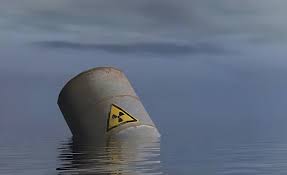The danger of indiscriminately releasing nuclear fission products into the ocean is that the products can find their way into the food chain, a New Zealand scientist said on the impending discharge of radioactive-contaminated cooling water from Japan’s Fukushima Daiichi Nuclear Power Plant into the Pacific Ocean.
“Once in the food chain, the longlived nuclear fission heavy nuclei like cesium-137, strontium-90, and iodine-131 tend to concentrate in human muscle, bones and thyroid, respectively. Cancers can be the result,” David Krofcheck, senior physics lecturer at the University of Auckland, said.
Tony Hooker, director of the Centre for Radiation Research, Education and Innovation at the University of Adelaide in Australia, said there is a growing question regarding the use of the sea as a dumping ground when oceans are already stressed and struggling.
“Dilution is no longer the solution to pollution,” Hooker said, adding that the Pacific Islands Forum scientific panel has proposed to use the wastewater to make concrete, therefore locking up the residual radioactive tritium.
“Japan’s plan to begin releasing the treated, contaminated cooling water into the Pacific Ocean is premature and presently, ill-advised,” Robert Richmond, director of the Kewalo Marine Laboratory at the University of Hawaii at Manoa, said.
“The peoples of the Pacific did not contribute to the present problems and have nothing to gain from Japan’s plan for the contaminated water release over the next 30 years, but have much at risk for generations to come,” he said, adding that it is in violation of the precautionary principle as well as transboundary safety considerations.
Media reports said Japan has set up a special fund of 80 billion yen (US$578.1 million) to subsidise the fishing industry in Fukushima.
Commenting on these reports, Chinese Foreign Ministry spokesman Wang Wenbin said on Friday the Japanese government’s attempt to buy silence from its people with money while turning a blind eye to the safety of people in neighbouring countries and Pacific Island nations will only lead to stronger questioning and opposition from the international community.
“If there is no problem with the nuclear-contaminated water that Japan plans to discharge into the sea, then why would the fishing industry in Fukushima be affected? If the Japanese government is not guilty about the discharge plan, then why did it prepare compensation fees to pacify people? This can only mean that there are indeed significant problems,” Wang said.
The Prime Minister of the Cook Islands and Chair of the Pacific Islands Forum, Mark Brown, received a visit last week from the Director General of the International Atomic Energy Agency (IAEA), Rafael Grossi, who led a mission to the Cook Islands from 10 – 11 July 2023.
The visit focused on presenting to the Forum Chair key aspects of the IAEA’s final Report on the Safety Review of the ALPS-Treated Water at the Fukushima Daiichi Nuclear Power Plant.
The presentation took place on 10 July (Cook Islands time) and was attended virtually by the Tongan Prime Minister Hu’akavameiliku, New Zealand Deputy Prime Minister Carmel Sepuloni, PIF Secretary General Henry Puna, and other senior level representation across the Forum membership. The IAEA Cook Islands visit was part of a multi-stop journey to Japan, South Korea, and New Zealand.
Released online on 04 July, the IAEA Report concludes that Japan’s plans to release the 1.3 million tonnes of treated radioactive nuclear wastewater into the Pacific Ocean over the next four decades meets international safety standards.
In his welcome remarks, PM Brown noted the critical work of the IAEA and its history of cooperation with Forum members, nine of whom are IAEA members.
“The Forum’s prior engagement with the IAEA have been related to the Pacific’s nuclear testing legacy, a legacy which continues to affect our people and our ocean, eight decades on. More than ever, our region’s co-operation with the IAEA and the international community, including through membership of the IAEA, is needed,” PM Brown said in his opening remarks.
Highlighting the Pacific Nuclear Free Zone established under the Treaty of Rarotonga, PM Brown expressed the region’s continued determination to ensure that the bounty and beauty of the ocean space, the land territory, and the airspace above them shall remain the heritage of our peoples and our descendants in perpetuity to be enjoyed by all.
The Forum Chair highlighted the importance of continued dialogue and genuine engagement on this issue moving forward. The Forum Chair will work with Forum Leaders on next steps.
SOURCE: CHINA DAILY/ PIFS/PACNEWS














